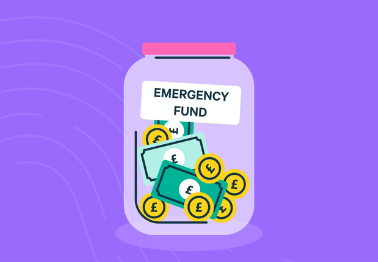Protection from Monetary Crisis
Consider the following scenario. You are your family’s breadwinner. You are currently on a much-needed, long-awaited vacation for your family, which you have saved up for. Suddenly, a family member of yours is involved in an accident. You’re stuck in the midst, helpless and moneyless (if such a thing exists!). Would you wish to be stranded in such an emergency? I am confident that you will say no. That is why you must understand the significance of Emergency Funds.
Emergency Funds
“Emergency funds” are synonymous with “backup plans.” They’re supposed to save our backs when we’re in difficulty. Problems and emergencies are unavoidable. And when problems happen, we can’t help but confront, correct, and solve them. And, of course, it comes at a cost, usually a hefty one. Life would be awful for people with little or no money at such times. This is where these monies come into play.
The main rationale for investing in emergency savings is to have money available whenever you need it. An emergency might be anything from the loss of a job to a little but pressing requirement. Regular income work is precarious, and its stability cannot be guaranteed. Investing in such funds allows us to protect ourselves for the rest of our lives. Regular investments in such funds can serve as a “support pay” for us.
Before investing in emergency money, consider the following:
1. The Strategy:
The most crucial aspects of emergency money are liquidity and security. Investors must be able to convert their investments into cash as soon as they require it. If this is not the case, having emergency cash is pointless. Investing in schemes with lock-in periods, such as ELSS, NPS, and PPF, will not aid in an emergency. Investing in high-risk but quickly liquid funds is also not an option in an emergency.
Some of the best options for such circumstances are:
- Account for Savings
- liquid assets
- Debt funds with ultra-short maturities
2. The Quantity:
Your emergency fund should cover at least three months of living expenses. Having three to eight months’ worth of expenditures covered would be ideal! If a person loses his or her employment, these cash will assist them in meeting their loan, EMI, and other obligations.
This is not the end of it. When a person’s salary and lifestyle change, their emergency fund allocations should alter as well.
Would you rather live in fear and doubt about your financial security, or would you rather have everything ready for emergencies?
Plan ahead of time and carefully!
Also read: What is Invoice discounting & How does it works?
Get in Touch with us
For any query/ personal assistance feel free to reach out at support@Altiusinvestech.com or call us at +91-8240614850.
To know, more about Unlisted Company. Click here – https://altiusinvestech.com/blog/what-is-listed-and-unlisted-company
For Direct Trading, Visit – https://altiusinvestech.com/companymain.
You can also checkout the list of Best 5 Unlisted Shares to Buy in India
For Direct Trading, Visit – https://trade.altiusinvestech.com/.

